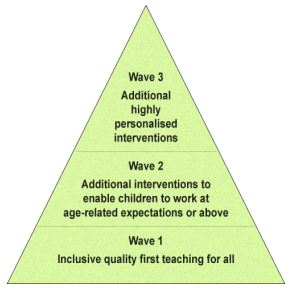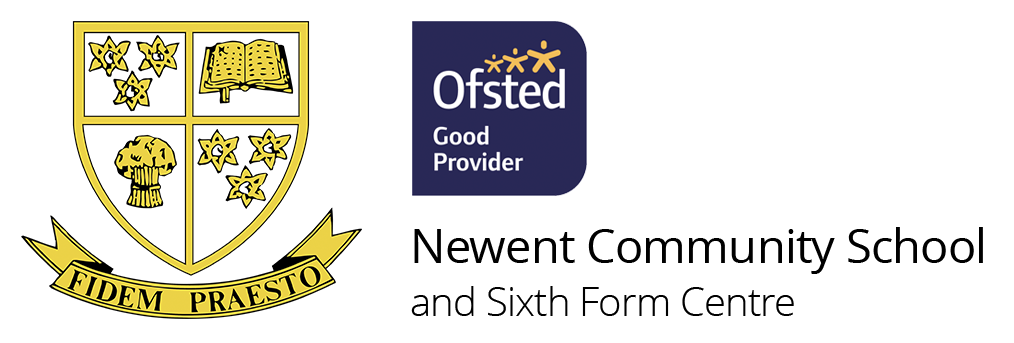
Special Educational Needs
At Newent Community School and Sixth Form Centre we:
- Ensure that students learn and interact in a caring, happy, safe and secure environment
- Make every effort to ensure equality of educational access and opportunity
- Provide maximum opportunity to develop and reach individual potential academically, socially and personally
- Encourage every student to develop their skills of communication
- Challenge students to become as independent as possible
- Listen to, and involve students, family/carers and other professionals in decision making
- Understand the importance of friendships and encourage respectful, trusting relationships throughout the school
- Facilitate the inclusion of all students, including those with Special Educational Need and/or Disability in the school curriculum, sports and activities such as visits and residential trips
- Empower students to be an individual
Our fundamental focus is on quality first teaching and learning in the classroom. However, we recognise that at some point some students also require additional support and intervention.
A guide for Parents and Carers which has been produced by the DFE is provided below for your reference.
Should you require any further information please do not hesitate to contact the SEND team, see details below.
SEND Team:
Mrs. Nikki Cunningham-Smith – SENCo
ncunningham-smith@newent.gloucs.sch.uk
Mr. Alex Tranter – Deputy SENCo
SEN Provision – 2024/2025 Questions and Answers
How does the school know / identify that children have special educational needs (SEN)?
Many students with additional need are identified whilst in primary school. The SENCo will meet with primary staff, students and parents / carers in Y6 to assess what level of need will be required at secondary school. Upon arrival in Y7 all students are assessed in order to identify any need not already known, as well as to undertake baseline testing to establish the level at which each student is working. Assessments include ARTi, an interactive reading test and Cognitive Ability Tests (CATs.) Staff and parents / carers can refer a student regarding SEND to the SENCo at any time in their school career. Information from parents / carers, students and outside agencies working with the student, such as a paediatrician, are also essential to this process.
What are the first steps our school will take if special educational needs are identified?
The SEN Inclusion Lead will alert teaching and support staff to the needs of the learner and will advise strategies for support. In some cases a student may be identified as likely to benefit from additional literacy or numeracy support in small groups. In other cases social skills or behaviour programmes may be appropriate. Staff and parents / carers are made aware of the identified need and intervention programmes in place through the school’s communication structures including the use of My Plan and My Plan + documents.
What should parents / carers do if they think their child has SEND? How can they raise concerns?
Parents / carers should contact their child’s tutor or the SEN Inclusion Lead directly by email, phone or in writing to discuss any concerns.
How will the school include parents / carers and students in planning support?
Regular meetings are held with parents / carers and students in order to plan and review support. Parents / carers and students are invited to share their views with staff using a ‘My Plan’ which details the additional need, as well as aspirations and strengths of the student.
How will the school teach and support children with SEND?
Every teacher is a teacher of students with SEND and most students will have their learning needs met within their teaching classes through differentiated practice and additional resources as required. Other students may receive small group support and tuition outside of the mainstream classroom.
For children with an Educational Health Care Plan (EHCP) at transition and at each plan review, the student, parents / carers and advisory parties will jointly assess the individual needs of the student concerned. Support may come in the form of, for example, teaching assistant support, small group teaching or the use of ICT.
How does the school plan the support? How are resources allocated and matched to needs?
Support is strategically planned at the start of each academic year to meet the needs of each student and reviewed as they progress through the academic year and through school. Close analysis of data and progress reports allow key staff to assess individual need. Learning Leads are also involved in highlighting support needs within their subject area and classroom teachers will request support within individual subject classroom settings.

Wave 1 Universal provision
Every teacher in Newent Community School and Sixth Form Centre is a teacher of students with additional need or SEND. Information is forwarded to staff and, for most students, this is all that is required in order that their needs are met within the classroom and that they access the same full, balanced curriculum as their peers.
Wave 2
Students that do not manage to gain level 4 in their English and/or Mathematics SATs are highlighted for additional support when they arrive. A number of students are withdrawn from non-core subjects to provide a focus upon reading, Mathematics and spelling where it is needed.
Wave 3
Some students, largely those at My Plan + or with EHCPs, require a more in-depth programme of support to help them succeed at secondary school. This may mean additional help with spelling, behaviour or speech, for example. The Learning Suite is a calm and relaxed area where students can be taught by trained Teaching Assistants and qualified teaching staff on a one to one or small group basis. We also have visits and clinics with outside agencies such as the Hearing Impairment Team or Speech and Language Advisors as well as opportunity to refer to trained counsellors and mentors where needed.
How will progress towards identified outcomes and effectiveness of our SEND provision be assessed and reviewed and how will you involve parents / carers, students and young people in this process?
The Senior Leadership Team monitor the progress and achievement of all students. Those who are not progressing and achieving as expected may be identified to receive intervention provision to support their learning. Students receiving intervention provision have reading and spelling age assessed three times a year to monitor progress in addition to the routine assessments that all students receive. If an approach needs adjusting this informs that process. Parents and students meet following reporting sessions and additional meetings can be provided as required or on request.
Who will be working with my child?
The SEN Inclusion Lead is the initial contact regarding students with SEND. The SEND team includes qualified Teaching Assistants who work in a number of classes as well as providing 1:1 or small group support in the Learning Suite.
How does the school ensure that the information about a student’s SEND or EHCP is shared and understood by teachers and all relevant staff who come into contact with that student?
Every July the SEN Inclusion Lead introduces the whole staff to the needs of the new SEND intake in advance of their arrival. The SEN Inclusion Lead also shares any new student information in a confidential electronic bulletin to all teaching staff weekly. Every teaching class register also identifies students with SEND. The SEN Inclusion Lead and team will provide staff with a ‘My Plan’ for each student with an EHCP or significant additional learning need.
What expertise does the school and staff have in relation to SEND?
All staff are regularly trained through external and internal provision in order to raise awareness of student need. Members of the Inclusion Team hold NVQ and teaching qualifications. Additional training regarding individual student need is held throughout the year to include key staff. The Inclusion Team has particular expertise in supporting Autism and Specific Learning Difficulties as well as in supporting students with receptive and expressive language difficulty.
Teaching strategies for students with learning difficulties are communicated via internal pedagogical resources for teaching staff as well as through support in the classroom and liaison with members of the Inclusion Team.
What support does the school put in place for young people who find it difficult to conform to normal behavioural expectations and how does it support children and young people to avoid exclusion?
A full range of strategies are deployed to support students to meet behavioural expectations. Strategies include the use of self and House staff monitoring behaviour cards, chill-out cards, referrals for counselling or mentoring support, either internally or from an outside agency. We operate an Individual Behaviour Plan structure which tailors the support a student will receive to their individual need as well as our expectations of them. We have close links with our local Alternative Education Service providers who can provide working in smaller groups and increased adult support for fixed periods of time as part of a strategy to enable mainstream schooling.
Which other services are used to provide for and support students?
We work closely with the Gloucestershire Advisory teaching Service and Educational Psychology Service as well as local GPs, paediatricians, voluntary and statutory organisations. We have regular visits from teachers for visual and hearing impairment and Counsellors from Teens in Crisis complement our internal mentoring team. In addition the school benefits from a well-qualified Medical Officer who is on site throughout the school week. The Medical and Student Welfare Officer oversees the provision of medication in school. It is important that any medical needs including allergies are reported to the Medical and Student Welfare Officer as soon as possible.
How does the school provide support to improve the emotional and social development of our SEND students?
Newent Community School and Sixth Form Centre prides itself upon its approach to pastoral support. Each student has a tutor as well as House affiliation which allows the development of a sense of pride and belonging in the school as well as the opportunity to build upon cultural, emotional and social learning. Our Personal Social, Health and Emotional Development programme is well respected regionally and nationally and is tailored to meet student need as they progress through the school. We have a designated member of staff; the Medical and Student Welfare Officer who is responsible for monitoring and coordinating support of more vulnerable students including those with social/care support in place outside of school.
What measures are in place in our school to prevent bullying?
Any incidence of bullying is dealt with by senior staff and teaching staff as soon as possible. Incidences of bullying are logged and those who are found to be bullying others are dealt with according to the school’s Behaviour Policy. Parents will be kept informed if there are bullying incidents concerning their child. Students receive full and clear education on all types of bullying and all students are shown how to report if they or another are experiencing bullying.
Who will be talking to and keeping in touch with parents / carers? (Working together towards outcomes, reviewing arrangements; including looked after children)
The Tutor and/or Head of House may communicate with parents / carers regarding pastoral need such as friendship or domestic issues. The Medical and Student Welfare Officer is key to supporting Looked After Children (LAC) students and those with social / care plans. For SEND concerns / communication the SENCo is the initial person to contact. The Assistant Principal may also be involved regarding incidents or concerns and will liaise with parents / carers as a result.
Parents / carers will receive a regular report regarding their child’s progress. In Key Stage 3 this will be four times a year and in Key Stage 4 five times a year. Parents and carers are also encouraged to use Satchel 1 to follow their child’s progress including the award of house points or other achievement.
How will school involve young people with SEND in their education?
Student voice is important to Newent Community School and Sixth Form Centre and students with SEND are
invited to join student panels. The use of student voice in the construction of the My Plan and My Plan +
is an effective tool for communicating student ideas for support as well as their aspirations and strengths.
What accredited and non-accredited courses do you offer for young people with SEND?
Students with SEND are offered the opportunity to enter GCSE subjects along with their peers. These include practical ‘hands-on’ subjects as well as academic.
An important role of secondary school is to prepare students for adult life and independent living. All students receive information regarding potential careers and training and are interviewed regarding GCSE options in Year 9 and Post 16 / Y12 options in Year 11. All students participate in work experience week in Year 10 and in Year 12 for those who continue on into the Sixth Form. Students with an ECHP will receive statutory advice regarding transition into college / the workplace from Year 9. Students with SEND requiring additional careers advice are met by external independent careers advisors at key points throughout Key Stage 4.
What special arrangements are made for exams?
Application for a variety of examination dispensation is available in school and is dependent upon need. Students are assessed at the beginning of Year 10 in preparation for their GCSE years. Dispensation can take the form of additional time, the use of ICT, a scribe or a reader. In some cases rest breaks, a prompt or a smaller room are appropriate. It is important that parents and students make the school aware of any short-term additional need at examination time – for example ill-health.
How accessible is your school to students with SEND?
In common with many secondary schools Newent Community School and Sixth Form Centre does not currently have full access to all areas for wheel chair users. However, a timetable can be constructed which will allow for as many lessons as possible to be attended on the ground floor. There is disabled toilet provision and the facility to change separately for sports activities.
What can I do if I am not happy with an aspect of my child’s education?
Initially it is often best to speak with the member of staff concerned however it may be appropriate to contact the Head of House or Assistant Principal regarding a pastoral issue or another member of the Senior Leadership Team.
Email the SEND / Inclusion Lead, Ms K Steger, at sen@newent.gloucs.sch.uk directly if you need general advice regarding SEND provision or contact the Parent Partnership Service, which is a free, confidential and impartial service for parents and carers of children with special educational needs. They can be contacted by email: pps@carersgloucestershire.org.uk or phone on 0800 158 3603.
